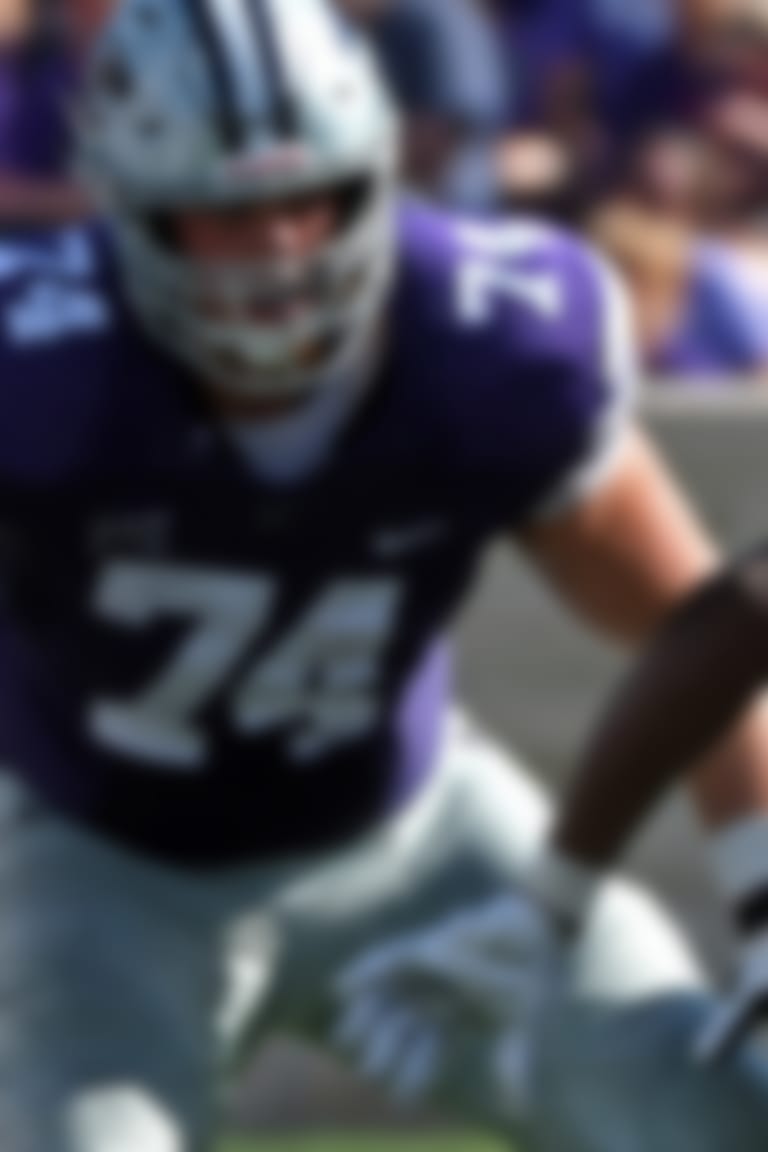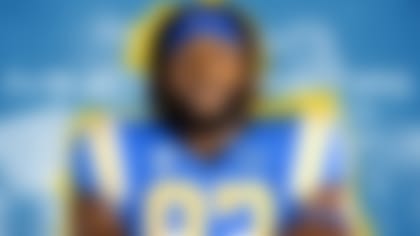Scott Frantz is the first openly gay player to enter the NFL draft since 2014, but is the league any more ready than it was five years ago with Michael Sam?
By Jeffri Chadiha | Published Oct. 16, 2019
MANHATTAN, Kan. -- Scott Frantz trembled, then felt tears welling in his eyes. He tried to listen intently as his Kansas State teammates talked about their own traumas -- growing up in poverty, losing loved ones, desperately fighting to be the first members of their families to attend college -- and he kept wondering if this really could be the time when he announced his sexual orientation to the entire Wildcats football team.
Now, at 19 years old and having just finished his redshirt freshman season, he started to feel differently. "In that moment when my teammates were telling personal things, I just had this urge growing inside me," Frantz said. "I kept feeling, This is your time. This is the best time you'll ever have to share what's been weighing me down for my entire life."
Finally, the session neared its end. Greenfield scanned the room, then announced there was time for one last player to talk. The coaches had scheduled a workout right after that meeting, so whomever was about to speak next had to hustle. Frantz slowly stood. His teammates had formed a circle to support everyone who spoke, so he trudged toward the middle of it, moving so cautiously that Risner thought his pal might faint. Once Frantz found himself in a position where he could see every face in the room, he sat down and took a few more minutes to collect himself.
When he eventually spoke, the words spilled out in an almost unintelligible mumble. A couple teammates instinctively reached out and held him, just so he knew he had their support. Once Frantz started talking clearly, he made two comments that struck Risner like thunderbolts. The first was that the deeply religious Frantz had hated himself for the last 10 years of his life. The other was that he'd prayed every night as to why God had made him like that.
Frantz recently recounted that story as he sat inside the team meeting room at the Vanier Family Football Complex at Kansas State. Instead of looking frightened and reticent, he had the confident feel of someone who's grown quite comfortable in his own skin over the last four years. He'd turned 23 only a couple months earlier -- on June 7 -- and he was savoring the opportunity to play his senior season for the Wildcats. Everything he'd feared before he came out to his teammates had vanished the moment he broke that news.
Frantz felt so good about that decision in March 2016 that he publicly announced his sexual orientation on ESPN a year later. He's also started every game in his career and earned a degree in secondary education and social sciences (he's currently pursuing a master's in special education). About the only question he hasn't been able to answer thus far is the one that will come when his college career ends: Will he find just as rewarding an experience when he tries to build a career in the NFL?
Michael Sam was the first openly gay athlete to try to make it in the league, but the most he accomplished was a two-month stint on the Dallas Cowboys practice squad. When Frantz gets his opportunity next year, the hope is that he's entering an environment that will be as accepting as the one he's enjoyed in college.
"Can he ball?" said Denver Broncos outside linebacker Von Miller when asked how an openly gay player would be treated. "That's the only thing that matters to me. Can you play football? That's first and foremost. Gay, male, female ... that's all I care about: If you can produce."
"We have a league where a lot of these young players have grown up in a very different world," added one AFC personnel director. "It's way more liberal now and a lot of (the discussion about the culture toward same-sex relationships) is way overrated. What's the difference between taking somebody who has a drug addiction or someone who beats his wife or somebody who has committed a felony? We take those guys in this league all the time. Having a gay man on the roster would be the least of my worries."
As encouraging as those statements might sound -- that fretting over adding a gay athlete to a roster is ridiculous when considering all the players with actual baggage who find jobs in the league every year -- the reality is Sam is the only gay man who ever felt comfortable pursuing an NFL career while being open about his sexuality. To date, there have been eight gay men who played in the league but didn't acknowledge their sexual orientation until after their playing careers were finished. One of them, Ryan O'Callaghan, who played six seasons in the NFL with the Patriots and Chiefs, estimates the league is filled with dozens of players facing a similar dilemma.
"There is at least one gay player on every team," said O'Callaghan, who recently authored a memoir entitled, "My Life on the Line: How the NFL Damn Near Killed Me and Ended Up Saving My Life." "I know of multiple players on one team, guys who were drafted last year and former Pro Bowl players. The LGBTQ community is pretty tight. We all try to help one another."
I CAN TELL YOU THAT ONE DUDE HAD HIS LOCKER MOVED TO THE OTHER SIDE OF THE ROOM WHEN THEY HEARD [MICHAEL SAM] WAS COMING TO THAT (COWBOYS) TEAM VETERAN NFL PLAYER
Those players likely haven't come out for the same reasons O'Callaghan didn't during his career and why Frantz remained closeted for most of his own life: It's frightening to think about what your life would be like when the world knows your biggest secret. It's even scarier when that secret comes out in a sport that is the epitome of masculine behavior.
"We have a misconception out there," said Jeff Fisher, who was the head coach of the St. Louis Rams when the team selected Sam in the seventh round of the 2014 draft. "The perception is that the gay male has a feminine soul, that there's nothing macho about being gay. And football is a bad-ass sport."
The ultra-masculine aura surrounding football stands at the entire center of the conversation about whether gay men can feel comfortable in the NFL. Free agent defensive end Ryan Russell, a three-year veteran who played with the Cowboys and Tampa Bay Buccaneers, recently revealed himself as bisexual in a first-person essay that appeared on ESPN.com. Speaking about that admission, Russell said, "The whole process has been extremely positive. I'm really surprised that I haven't had a negative experience. Nobody has fallen out of my life." At 27 years old and in the prime of his career, he's also still hoping to find another job in the league.
Former NFL running back Larry Johnson made his own headlines shortly after the news about Russell broke. A two-time All-Pro with the Kansas City Chiefs, Johnson wrote on Twitter that "There is an Effeminate Agenda going on amongst the NFL & NBA Elite, peddled by high ranking Masons/handlers to indoctrinate the heterosexual sports world without them knowing, for the buying power of the LGBTQ community … But we not ready to have that conversation yet."
Johnson also suggested that Sam's presence in the league was a "planned" attempt to gauge public reaction and that players suspiciously wear pink uniform items in October, which happens to be LGBT History Month. (The players have typically worn such apparel in support of breast cancer awareness, which is also highlighted in October.) Johnson has had his own personal issues -- he was arrested five times in his career because of allegations of violence against women and now believes he suffers from chronic traumatic encephalopathy -- but it would be foolish to assume he's the only person thinking this way.
When asked how an openly gay football player would be treated in the NFL today, former Cincinnati Bengals head coach Marvin Lewis said, "There would be some apprehension from some players, but it would go away quickly." A veteran player, speaking on the condition of anonymity, was more pessimistic, saying it's likely that "50 percent of the league wouldn't be into it." That same player also was a member of the Cowboys when Sam was on that team's practice squad. As the player said, "I can tell you that one dude had his locker moved to the other side of the room when they heard he was coming to that team."
When O'Callaghan played for New England from 2006 through '08, he became accomplished at protecting himself from the more archaic views about the place sexual orientation could have in pro football. He instinctively knew how to offer certain cues that kept his teammates from questioning him. One year he brought a woman to an annual anniversary party thrown by team owner Bob Kraft and Kraft's now deceased wife, Myra. O'Callaghan figured his teammates wouldn't think twice about his sexuality if he had an attractive woman on his arm.
As a bisexual, Russell said he didn't have to "parade" around with women because he actually liked dating them. What he did do was keep his more creative interests, such as writing poetry, hidden from his teammates, explaining that "it wasn't a narrative that played well with football." Said Russell: "I'm far more aware of and protective of myself now, whereas before I was in competition with myself."
Wade Davis wasn't good enough to make an NFL roster as a cornerback in the early 2000s. However, he also was determined to keep his sexual orientation a secret during his playing days, so much so that little moments made him ponder how hard his life had become. When he was trying to make the Washington Redskins during the 2003 season, he found himself watching film with Pro Bowl cornerback Champ Bailey and a couple other teammates. When Bailey mentioned that too many young defensive backs create problems on the field by relying on "wasted motion" -- Bailey was referring to a habit of taking an extra step when breaking on a ball -- Davis immediately thought about how much wasted motion was involved in his own attempt to sell the world on his being a heterosexual.
As Davis stressed, it's not just enough for people to talk about their willingness to accept gay men in the NFL. The conversation is far more nuanced than that and filled with issues that go far deeper than just the question of whether a straight football player can be cool with a gay teammate. O'Callaghan recognizes this every time he's invited to talk to a team. He often starts his discussions by asking players how they would respond if a teammate came out to them. If the room stays silent, he cuts deeper.
"I'll ask them how they would respond if they were in the shower and they thought a gay teammate was checking them out," O'Callaghan said. "That's when they'll start grumbling and it's also when we can really start talking."
Davis faced similar reactions when he became the league's first diversity and inclusion consultant in 2014. He spent the last five years talking to teams on a regular basis and taking the approach that everything was inbounds. His sessions usually last 90 minutes, but he had one memorable interaction with a team that went nearly two and a half hours. It was the kind of discussion that Davis feels is vital to moving the ball forward on gay players feeling more included in today's NFL.
Davis started that event in a typical fashion -- by waiting until he was 45 minutes into his talk before acknowledging that he was gay. As soon as that happened, one player in the crowd said, "Damn, I thought you were like me!" A few moments later, another player raised his hand and said, "Hey, homie -- I don't mean no disrespect, but I don't want to play with a gay player." Instead, of taking offense, Davis had a different response: His eyes lit up with obvious interest.
"I was excited to hear that," said Davis, who just recently left the NFL for a new job. "I said, 'Tell me more.' And he was shocked that I was curious. But when it was over, he gave me his number and told me to give him a call to talk more about this. He said that nobody had ever given him the openness to talk about this stuff. He thought being gay meant being a pedophile. But that's also why it's so important to get to 'zero' (the bottom line) when discussing this. You have to get to 'zero' before you can have a real conversation."
Frantz found his truth in that motivational seminar with his teammates. As soon as he told them he was gay, the players swarmed him instinctively. Some gave him high-fives and fist-bumps. Others hugged him joyfully, as if he'd just emerged as the hero in the national championship game. Frantz already had told head coach Bill Snyder about his sexuality a few days earlier. Now he was seeing the full impact of Snyder's advice to him after their meeting -- that he would benefit greatly from informing his teammates about who he really was.
The celebration lasted long enough that the coaches started wondering why the players were running so late for their scheduled workout. Once they arrived, Frantz described himself as "floating" through the rigorous drills after receiving such instant support.
"I did have fears of coming out," Frantz said. "But the bottom line was that no matter what would've happened, it would've been better than living with that weight on my shoulders. Obviously, I feared relationships changing. We had such a great group of guys that I knew it wasn't going to change drastically. I wasn't worried about the locker room or losing my friends. Ultimately, I was most worried about telling my family."
Frantz returned home to his family's house in Lawrence a week later. His parents, Kim and Stan, were sitting around when he walked in and told them he wanted to talk about something. There wasn't the same stifling anxiety this time around. Frantz just told them straight up that their youngest son was gay. Kim and Stan responded in much the same way as Scott's teammates, as they hugged him and emphasized how much they loved him.
The parents also acknowledged how much that news jolted them. In fact, Kim cried when Scott left the room after the conversation. "It was hard," Stan said. "It was a shock. You start worrying about how other people will treat him and perceive him without knowing him. That was my worry."
GOING IN, I KNEW IT WOULD BE IGNORANT OF ME TO SAY SOMETHING LIKE, 'YOUR SON IS GAY AND I EXPECT YOU TO UNDERSTAND RIGHT AWAY.' I TOLD THEM AND THEN I GAVE THEM SOME SPACE." SCOTT FRANTZ
Added Kim: "You could tell he felt so much better after telling us. Scott is an authentic person and not being authentic was hard for him. One of the toughest things for us was just thinking about how he went through all of this on his own. It made you feel really sad."
Frantz did something during that conversation with his parents that spoke to his maturity at the time. He told them he appreciated their love and support but that he also understood they needed time to process everything that was changing in their lives. Both of his parents grew up in small, conservative towns. Raised as a Mennonite, Stan had been taught that being gay was a sin.
The one thing Scott realized was that he'd been trying to accept his sexual orientation since he was in the fifth grade. What he couldn't do was think his parents were going to accept it in a couple hours.
"I knew they loved me so much that nothing would change that," Frantz said. "I just needed to give them time to think and reflect and hopefully understand. Going in, I knew it would be ignorant of me to say something like, 'Your son is gay and I expect you to understand right away.' I told them and then I gave them some space."
Frantz spent the next year of his life reveling in all the acceptance he received. Shortly after he came out to the football team, Risner texted him and invited him to dinner. They went to a Longhorn Steakhouse and spent the next three hours talking about what Frantz had been through while living a double life. Risner already had great respect for Frantz, both as a player and as a young man with a deep religious faith. That admiration increased as they talked more about Frantz's journey.
Frantz appreciated that initial gesture by Risner, as well as the treatment he received from his teammates in the year that followed. As was the case with Sam when he played at Missouri, not one player on the 2016 Kansas State football team allowed the news of Frantz's sexuality to become public. He never asked his teammates to keep it a secret. They just decided that was how they would show their support.
"When I encouraged Scott to share his thoughts with his teammates in an open forum, I had great confidence that our players would accept it appropriately and then move on," said Snyder, who retired from coaching following the 2018 season. "Our players didn't share it with anybody. From that point on, nobody even thought about it. It was business as usual."
The difference in Frantz before and after his announcement was pronounced. He talked more around his teammates. He didn't seem as stressed about daily issues. He also played like the highly touted recruit Snyder had expected him to become when Frantz committed to Kansas State.
Frantz became the first Kansas State freshman to start every game at left tackle since 1988. He was named to the first-team Academic All-Big 12 team and he played so well in the Texas Bowl -- helping to hold Texas A&M defensive end Myles Garrett, a player who would become the top overall pick in the 2017 draft, to one tackle -- that he received All-Bowl honors from the Associated Press. Frantz was living exactly the kind of life he hoped to have. He was having such a good time that he decided it was time to take another bold step: He wanted to let the entire world in on the secret he'd buried for most of his life.
The NFL started to think about taking a proactive approach toward addressing LGBTQ issues in 2014. Troy Vincent, the league's executive vice president of football operations, connected with Davis and began the process of scheduling various seminars for educating teams on the importance of inclusion.
"At that time, we weren't hearing from the people this affected the most," Vincent said. "Wade had the chance to speak to football personnel about his experiences and how to communicate, both internally and externally, when the topic arose. Our thinking was, 'Let's hear from the men and women who are gay.' It was about bridge-building."
It's been an honorable mission, but it also hasn't addressed the own stigma some players feel by the time they reach the NFL. O'Callaghan knew he was gay when he hit puberty. When his friends started to develop crushes on girls, he wondered why he didn't have the same attraction to the opposite sex. Once he became a local football standout in Redding, California, he saw the game as an ideal way to hide his true nature.
"Everybody saw me as this masculine guy," O'Callaghan said. "I thought this is a great cover. I can use this."
I DON'T USE THE LANGUAGE OF CHANGING HEARTS AND MINDS. WE ONLY SAY THAT ABOUT PEOPLE THAT WE THINK NEED TO GROW, WHEN THE TRUTH IS WE ALL DO. WADE DAVIS
By the time O'Callaghan left the University of California and entered the NFL in 2006, he said, "I was so deeply closeted and blind to the outside world that I never recognized my options. I just got to a point where I was really miserable. I knew I was gay. I just didn't see any potential positives in being an openly gay man."
Davis experienced similar feelings. A self-described "scrub" who tried to make the roster of three different NFL teams between 2000 and 2004 (Tennessee, Seattle, Washington), he remembers being "hyper-vigilant about nobody every reading me as gay. The one benefit that came from being able to play for Coach Fisher (in Tennessee) was that he was a player's coach and knew what the locker room was like. He knew what should be allowed to go on in there. Some coaches weren't that way."
When former players like O'Callaghan and Davis talk about the NFL environment toward same-sex relations, they emphasize that it is a two-way street. On one hand, there are players very much like themselves who have spent years living double lives. The longer those players live those lives, the more threatened they feel to come out. In fact, Russell talked about how the pressure to provide for the single mother who raised him played a pivotal role in keeping his sexuality a secret.
"I didn't want to do anything that would jeopardize that," Russell said. "I put my sexuality in the same box as I wouldn't drink during the season or spend six hours a day playing video games. It became a routine sacrifice that you made to play at the highest level."
The other aspect of this dynamic is the world these players must live in every day. As often as heterosexual athletes will say they don't have an issue with gay players, the reality is that there are often subtle cues inside locker rooms that can convey a more threatening vibe. For example, Davis said he heard the word "faggot" uttered regularly when he was playing high school football. He rarely heard that slur in the NFL, but the word "bitch" -- which is common, according to Davis -- could have a similarly negative impact on a gay man.
What could be perceived as guys having typical locker room fun -- Marvin Lewis said he's had players who suspected some teammates were gay because those players would admire their own physiques while lifting weights -- might also make a gay athlete wonder if he'd be ostracized because of certain actions.
When Davis had his first opportunity to speak to coaches at the 2014 NFL Annual Meeting in Orlando, he spent a good amount of time stressing the importance of straight players, executives and owners openly reinforcing their beliefs about wanting to include gay athletes in pro football. It was the first indication of Davis' potential to teach the league about LGBTQ people and their lives. "Because of Wade's experience, expertise and education, he's able to speak in a way that engages (people)," Vincent said. "He normalized this discussion with that audience."
"I talked about the idea that just because you're gay, that doesn't mean you haven't been here before," Davis said. "We've been in locker rooms since little league, so we know how to comport ourselves. I talked about the idea of wasted motion -- how if you don't create the environment for players to come out, you'll have guys spending a lot of time living double lives. I then told them the ask is not that you're perfect but that you stay in it. That when (heterosexuals) make a mistake (in dealing with a gay person), that they recognized it and wanted to continue to grow. I don't use the language of changing hearts and minds. We only say that about people that we think need to grow, when the truth is we all do."
Davis' words were moving enough that John Fox, the head coach of the Denver Broncos at that time, approached him afterward and told him it was the best talk he had heard at an owners meeting. Fisher was impressed in a different way. When Davis first took the stage, the Rams head coach kept studying him quizzically, trying to recall how he knew this guy. The face looked familiar, but Fisher also had spent nearly two decades as an NFL head coach by that point. There was no way he easily could've remembered a player who wasn't good enough to survive final cuts with the Titans in two separate seasons.
As Fisher recalled, "When Wade took the stage, I kept asking myself where I knew this guy from. Then he just tore me apart (for not keeping Davis with the Titans). But when he talked about keeping a girlfriend just so he could fit in, I thought about how difficult that must have been for him. That's what isn't fair. When somebody has to hide like that, that's not living a freedom of life."
Fisher wound up talking with Davis after the session, as well. He didn't know exactly how he wanted to utilize all the information Davis had offered but the coach did see substantial value in it. The world was changing rapidly. Fisher wanted to stay ahead of the curve when it came to social issues.
A little over a month later, Fisher sat in the Rams war room with general manager Les Snead as the 2014 draft neared its conclusion. The seventh round had started, and the Rams were weighing the remaining options on their board. There were two players they liked, but only one was still the highest-rated player in their mind: Michael Sam. So, Fisher and Snead chatted. Then Fisher called Rams owner Stan Kroenke to explain their thinking.
Sam had attracted major media attention ever since he came out in a televised interview two months before the draft. He had enjoyed plenty of success as a collegian -- along with being named an All-American, he was the Southeastern Conference Co-Defensive Player of the Year in 2013 -- but the bigger story revolved around whether any NFL team would make him the first openly gay man drafted into the NFL.
"There really were two guys we liked," Fisher said. "And ultimately we decided on Mike."
The first call Fisher made after the conversation with Kroenke was to Sam. The second one was far more telling. It was to Wade Davis.














